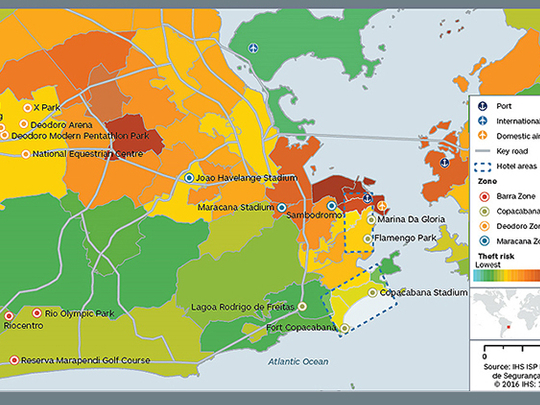
The main threat to visitors of the 2016 Olympic Games in Rio de Janeiro is street robbery: having wallets, mobile phones, purses, or jewellery stolen, sometimes with the threat or use of violence, according to a global intelligence firm.
Those venturing outside tourist zones and Olympic sites are at particular risk, IHS Markit, a world leader in critical information, analytics and solutions, says in a new Rio City risk intelligence report. The report assesses street-level risk intelligence based on a comprehensive assessment of the latest open source events, statistical crime rate data and on the ground human source intelligence.
“A total of 85,000 security personnel will be deployed in Olympic venues and tourist areas, double the number mobilized during the London 2012 Olympics, and more than the 2014 Brazil World Cup,” according to Carlos Caicedo, senior principal analyst, IHS Country Risk.
“IHS assesses that this saturation of security force deployment will be effective in containing crime, unrest and vandalism during the Olympics, as was the case during the World Cup,” he added.
Theft hotspots include downtown Rio, particularly the areas close to Uruguaina, Presidente Vargas and Central Metro stations.
Additional spots include the main hotel areas, specifically the beach promenades of Copacabana, Leblon and Ipanema, where tourists are less alert, facilitating opportunistic snatch-and-run theft. Homicide affects mostly locals in the city's slums rather than tourist zones or areas located near Olympic sites.
The total cost of the Rio Games came in at $4.1 billion (Dh15.06 billion), well below the $6.4 billion included in the original bidding. This compares well with the London 2012 Games, which cost $6.5 billion. It is also worth noting that about 70 per cent of the total cost of the Rio games was funded by the private sector.
Additionally, the federal government has also authorized extraordinary aid worth $850 million, which is being used to pay wages of public servants, particularly police officers, who had not received their salaries since May. This is likely to mitigate the risk of police, who protested at Rio’s Galeão international airport in late June and early July, from going on strike during the Olympic Games.





